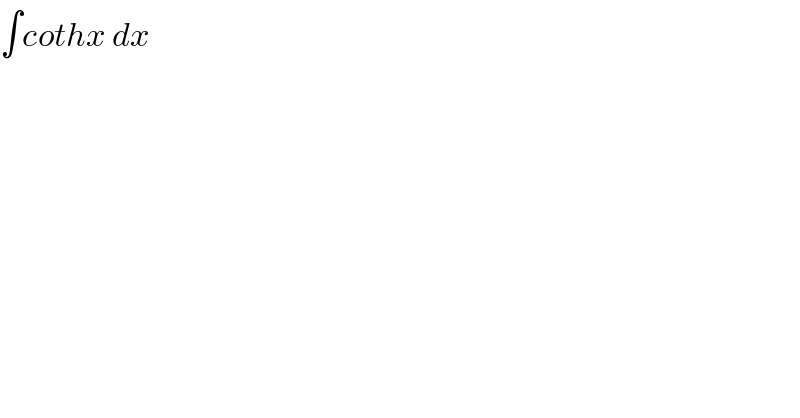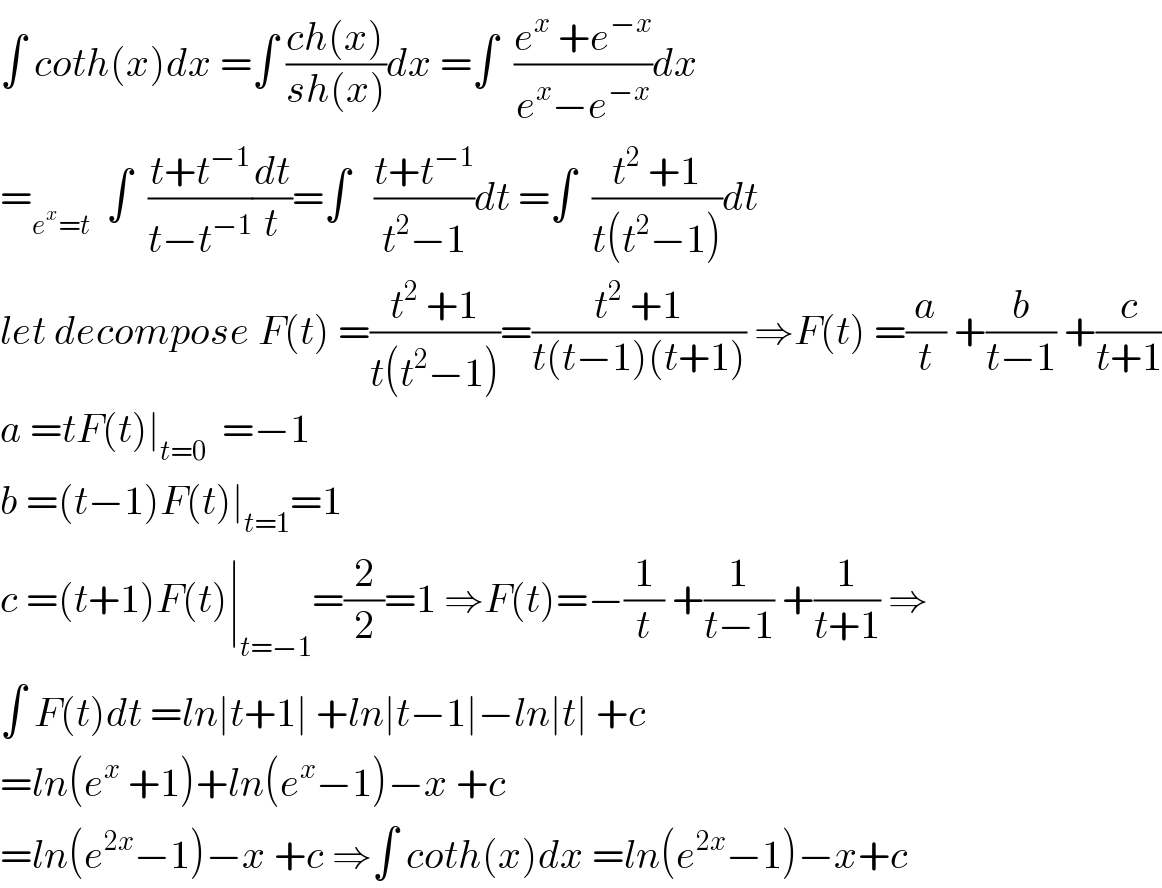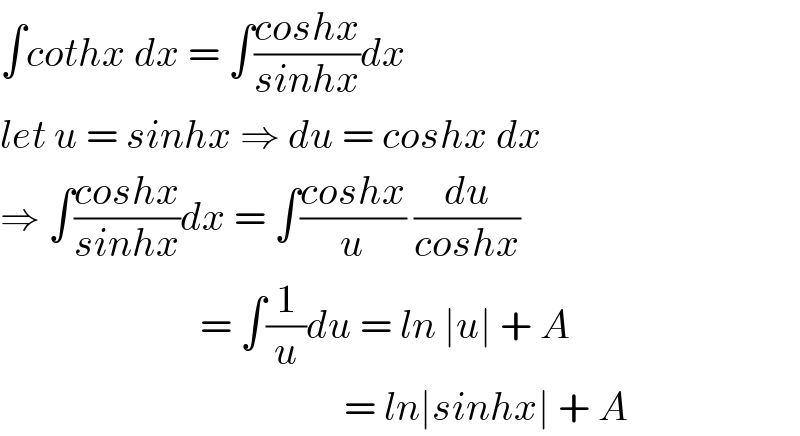
Question Number 76469 by kaivan.ahmadi last updated on 27/Dec/19

$$\int{cothx}\:{dx} \\ $$
Commented by mathmax by abdo last updated on 27/Dec/19

$$\int\:{coth}\left({x}\right){dx}\:=\int\:\frac{{ch}\left({x}\right)}{{sh}\left({x}\right)}{dx}\:=\int\:\:\frac{{e}^{{x}} \:+{e}^{−{x}} }{{e}^{{x}} −{e}^{−{x}} }{dx} \\ $$$$=_{{e}^{{x}} ={t}} \:\:\int\:\:\frac{{t}+{t}^{−\mathrm{1}} }{{t}−{t}^{−\mathrm{1}} }\frac{{dt}}{{t}}=\int\:\:\:\frac{{t}+{t}^{−\mathrm{1}} }{{t}^{\mathrm{2}} −\mathrm{1}}{dt}\:=\int\:\:\frac{{t}^{\mathrm{2}} \:+\mathrm{1}}{{t}\left({t}^{\mathrm{2}} −\mathrm{1}\right)}{dt} \\ $$$${let}\:{decompose}\:{F}\left({t}\right)\:=\frac{{t}^{\mathrm{2}} \:+\mathrm{1}}{{t}\left({t}^{\mathrm{2}} −\mathrm{1}\right)}=\frac{{t}^{\mathrm{2}} \:+\mathrm{1}}{{t}\left({t}−\mathrm{1}\right)\left({t}+\mathrm{1}\right)}\:\Rightarrow{F}\left({t}\right)\:=\frac{{a}}{{t}}\:+\frac{{b}}{{t}−\mathrm{1}}\:+\frac{{c}}{{t}+\mathrm{1}} \\ $$$${a}\:={tF}\left({t}\right)\mid_{{t}=\mathrm{0}} \:\:=−\mathrm{1} \\ $$$${b}\:=\left({t}−\mathrm{1}\right){F}\left({t}\right)\mid_{{t}=\mathrm{1}} =\mathrm{1} \\ $$$${c}\:=\left({t}+\mathrm{1}\right){F}\left({t}\right)\mid_{{t}=−\mathrm{1}} =\frac{\mathrm{2}}{\mathrm{2}}=\mathrm{1}\:\Rightarrow{F}\left({t}\right)=−\frac{\mathrm{1}}{{t}}\:+\frac{\mathrm{1}}{{t}−\mathrm{1}}\:+\frac{\mathrm{1}}{{t}+\mathrm{1}}\:\Rightarrow \\ $$$$\int\:{F}\left({t}\right){dt}\:={ln}\mid{t}+\mathrm{1}\mid\:+{ln}\mid{t}−\mathrm{1}\mid−{ln}\mid{t}\mid\:+{c} \\ $$$$={ln}\left({e}^{{x}} \:+\mathrm{1}\right)+{ln}\left({e}^{{x}} −\mathrm{1}\right)−{x}\:+{c} \\ $$$$={ln}\left({e}^{\mathrm{2}{x}} −\mathrm{1}\right)−{x}\:+{c}\:\Rightarrow\int\:{coth}\left({x}\right){dx}\:={ln}\left({e}^{\mathrm{2}{x}} −\mathrm{1}\right)−{x}+{c} \\ $$
Commented by mathmax by abdo last updated on 27/Dec/19

$${forgive}\:\int\:{coth}\left({x}\right){dx}\:={ln}\mid{e}^{\mathrm{2}{x}} −\mathrm{1}\mid\:−{x}\:+{c} \\ $$
Commented by kaivan.ahmadi last updated on 29/Dec/19

$${thank}\:{sir} \\ $$
Answered by Rio Michael last updated on 27/Dec/19

$$\int{cothx}\:{dx}\:=\:\int\frac{{coshx}}{{sinhx}}{dx} \\ $$$${let}\:{u}\:=\:{sinhx}\:\Rightarrow\:{du}\:=\:{coshx}\:{dx} \\ $$$$\Rightarrow\:\int\frac{{coshx}}{{sinhx}}{dx}\:=\:\int\frac{{coshx}}{{u}}\:\frac{{du}}{{coshx}} \\ $$$$\:\:\:\:\:\:\:\:\:\:\:\:\:\:\:\:\:\:\:\:\:\:\:\:\:=\:\int\frac{\mathrm{1}}{{u}}{du}\:=\:{ln}\:\mid{u}\mid\:+\:{A} \\ $$$$\:\:\:\:\:\:\:\:\:\:\:\:\:\:\:\:\:\:\:\:\:\:\:\:\:\:\:\:\:\:\:\:\:\:\:\:\:\:\:\:\:\:\:=\:{ln}\mid{sinhx}\mid\:+\:{A} \\ $$
Commented by kaivan.ahmadi last updated on 29/Dec/19

$${thank}\:{u} \\ $$
Answered by Henri Boucatchou last updated on 28/Dec/19

$$=\:{ln}\left({e}^{{x}} −{e}^{−{x}} \right)+{C}^{{st}} \\ $$
